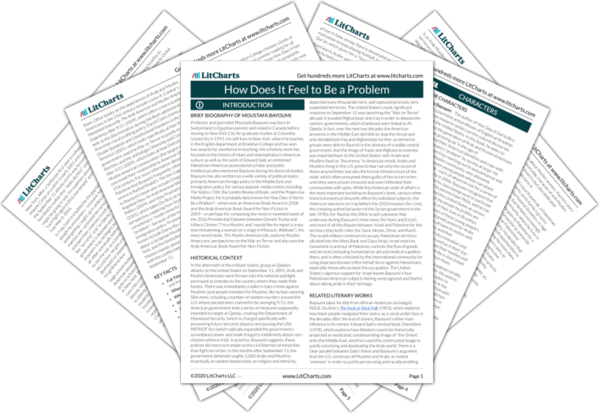Yasmin Quotes in How Does It Feel to Be a Problem?
“911. What's your emergency?”
“There's a white couple on a city bus. I think she has a bomb in her purse. It's a 863 bus, going up Fifth Avenue. The license plate is . . .”
She wanted to call. She really did, just to make a point, to make them feel the same way—singled out, powerless, discriminated against, a source of irrational fear. But she didn't call. In fact, she didn't do anything, and because of that she was annoyed with herself.
“With all due respect to your religion, sir, how long do you think you can control your daughter?”
I was forced to submit my resignation due to the system's inability to understand my moral obligations. For example, my beliefs prevent me from having anything to do with drinking/dancing. When I was young, the system told me to stand up and fight for what I believe in. While now I am being told to do the exact opposite, instead I should give up what I believe in for some rules and regulations. Martin Luther King Jr. fought for what he believed in and gave up his life for it. I too am taking that same stand by giving up my position to defend what I believe in.
What hurt me most was that when I won secretary as a Freshman, I felt that I had achieved my dreams and broken a racial barrier that I thought would hold me back. I finally felt that as a Muslim that I was doing something and I could make a difference in the world. I believed people would have confidence in me because of what was in my heart and not prejudice against my outer appearance—I had hope that I could achieve my dreams—but when they took me out I felt different and segregated and it shattered everything I had hoped and dreamed of. Now all I feel is hurt, sadness, and I feel that as a Muslim I can never be something because America is prejudiced so much and will never let people like me succeed no matter how hard we try. I never told anyone that this is what really hurts me and makes me cry. My family doesn't even know that I still cry and that I am still hurt and think about it every day. I felt so bad, and knowing how that feels, I don't want to have anyone else go through what I went through, Muslim or non-Muslim.

Yasmin Quotes in How Does It Feel to Be a Problem?
“911. What's your emergency?”
“There's a white couple on a city bus. I think she has a bomb in her purse. It's a 863 bus, going up Fifth Avenue. The license plate is . . .”
She wanted to call. She really did, just to make a point, to make them feel the same way—singled out, powerless, discriminated against, a source of irrational fear. But she didn't call. In fact, she didn't do anything, and because of that she was annoyed with herself.
“With all due respect to your religion, sir, how long do you think you can control your daughter?”
I was forced to submit my resignation due to the system's inability to understand my moral obligations. For example, my beliefs prevent me from having anything to do with drinking/dancing. When I was young, the system told me to stand up and fight for what I believe in. While now I am being told to do the exact opposite, instead I should give up what I believe in for some rules and regulations. Martin Luther King Jr. fought for what he believed in and gave up his life for it. I too am taking that same stand by giving up my position to defend what I believe in.
What hurt me most was that when I won secretary as a Freshman, I felt that I had achieved my dreams and broken a racial barrier that I thought would hold me back. I finally felt that as a Muslim that I was doing something and I could make a difference in the world. I believed people would have confidence in me because of what was in my heart and not prejudice against my outer appearance—I had hope that I could achieve my dreams—but when they took me out I felt different and segregated and it shattered everything I had hoped and dreamed of. Now all I feel is hurt, sadness, and I feel that as a Muslim I can never be something because America is prejudiced so much and will never let people like me succeed no matter how hard we try. I never told anyone that this is what really hurts me and makes me cry. My family doesn't even know that I still cry and that I am still hurt and think about it every day. I felt so bad, and knowing how that feels, I don't want to have anyone else go through what I went through, Muslim or non-Muslim.











